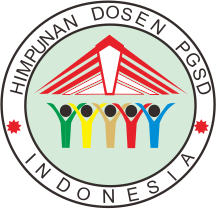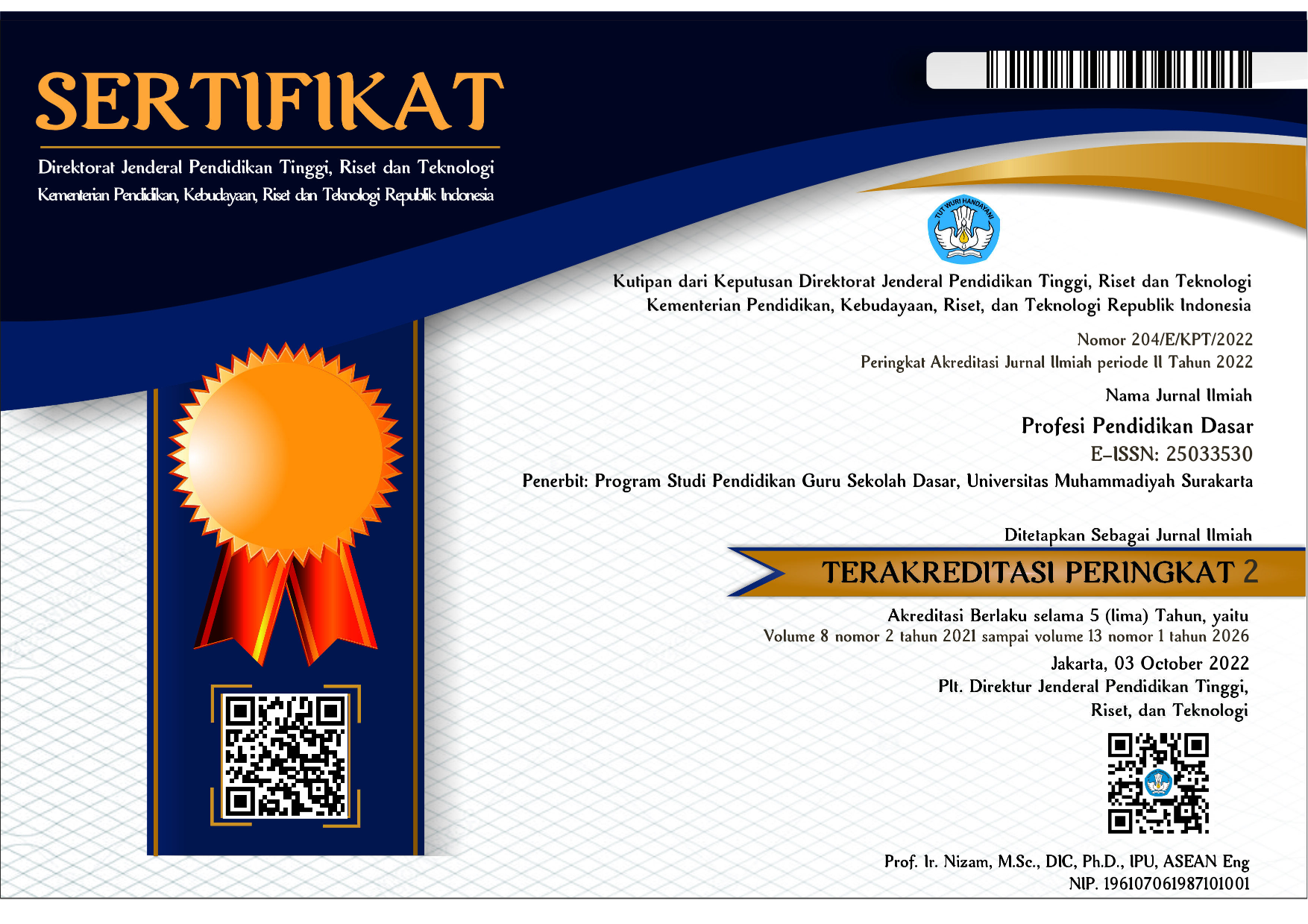Supporting Parents’ Needs as Educational Partners to Enhance Children’s Classroom Learning
Denise Miller(1), Roy Venketsamy(2*)(1) University of Pretoria
(2) University of Pretoria
(*) Corresponding Author
Abstract
Keywords
Full Text:
PDFReferences
Antony-Newman, M. (2019). Parental Involvement Policies in Ontario: A Critical Analysis. School Community Journal, 29(1), 143–170. https://eric.ed.gov/?id=EJ1220084
Badat, S., & Sayed, Y. (2014). Post-1994 South African Education: The Challenge of Social Justice. The ANNALS of the American Academy of Political and Social Science, 652(1), 127–148. https://doi.org/10.1177/0002716213511188
Baumrind, D., Larzelere, R. E., & Owens, E. B. (2010). Effects of Preschool Parents’ Power Assertive Patterns and Practices on Adolescent Development. Parenting, 10(3), 157–201. https://doi.org/10.1080/15295190903290790
Calear, A. L., McCallum, S., Morse, A. R., Banfield, M., Gulliver, A., Cherbuin, N., Farrer, L. M., Murray, K., Rodney Harris, R. M., & Batterham, P. J. (2022). Psychosocial Impacts of Home-Schooling on Parents and Caregivers during the COVID-19 Pandemic. BMC Public Health, 22(1), 119. https://doi.org/10.1186/s12889-022-12532-2
Caño, K. J., Cape, M. G., Cardosa, Jacient Mar, Miot, C., Pitogo, G. R., Quinio, C. M., & Merin, J. (2016). Parental Involvement on Pupils’ Performance: Epstein’s Framework. The Online Journal of New Horizons in Education, 6(4), 143–150.
Castro, M., Expósito-Casas, E., López-Martín, E., Lizasoain, L., Navarro-Asencio, E., & Gaviria, J. L. (2015). Parental Involvement on Student Academic Achievement: A Meta-analysis. Educational Research Review, 14, 33–46. https://doi.org/10.1016/j.edurev.2015.01.002
Constitution of South Africa, (1996).
Creswell, J. W. (2014). Research design: Qualitative, quantitative, and mixed methods approaches. SAGE.
DeForge, R., & Shaw, J. (2012). Back- and fore-grounding ontology: Exploring the linkages between critical realism, pragmatism, and methodologies in health & rehabilitation sciences: Back- and fore-grounding ontology. Nursing Inquiry, 19(1), 83–95. https://doi.org/10.1111/j.1440-1800.2011.00550.x
Dimopoulos, K., Koutsampelas, C., & Tsatsaroni, A. (2021). Home Schooling through Online Teaching in the Era of COVID-19: Exploring the Role of Home-related Factors That Deepen Educational Inequalities Across European Societies. European Educational Research Journal, 20(4), 479–497. https://doi.org/10.1177/14749041211023331
Department of Co-operative Governances, Disaster Management Act. (2020). Amendment of Regulations issued in terms of Section 27(2). Pretoria. Government Printers.
Department of Basic Education. (2020). Standard Operating Procedure for the Containment and Management of Covid-19 for Schools and School Communities. Pretoria. Government Printers
Department of Education, Employment and Workplace Relations (DEEWR). (2008). Family-school partnerships framework: A guide for schools and families. Australian Government, [Canberra, Australian Capital Territory]: Department of Education, Employment and Workplace.
Ellis, M., Lock, G., & Lummis, G. (2015). Parent-teacher interactions: Engaging with parents and carers. Australian Journal of Teacher Education, 40(5). https://doi.org/10.14221/ajte.2015v40n5.9
Epstein, J. L. (1986). Parents' Reactions to Teacher Practices of Parent Involvement. The Elementary School Journal, 86(3), 277-294.
Epstein, J.L. (1987). Toward a theory of family-school connections: Teacher practices and parent involvement. In K. Hurrelmann, F.X. Kaufmann & F. Lösel (Eds.), Social intervention: Potential and constraints. Walter De Gruyter. pp. 121-136.
Epstein, J.L. (2018). School, family, and community partnerships: Preparing educators and improving schools. London: Routledge.
Epstein, J.L., Sanders, M.G. & Sheldon, S.B. (2007). Family and community involvement: Achievement effects. Retrieved December 10, 2010.
Epstein, J. L., Sanders, M. G., Sheldon, S. B., Simon, B. S., Salinas, K. C., Jansorn, N. R., Greenfeld, M. D. (2018). School, family, and community partnerships: Your handbook for action: Corwin Press.
Epstein, J. L., & Van Voorhis, F. E. (2000). Teachers Involve Parents in Schoolwork (TIPS) Interactive Homework Training Materials [Overhead Transparency Packet]
Fitriah, A., Sumintono, B., Subekti, N. B., & Hassan, Z. (2013). A different result of community participation in education: An Indonesian case study of parental participation in public primary schools. Asia Pacific Education Review, 14(4), 483–493. https://doi.org/10.1007/s12564-013-9275-8.
Georgis, R., Gokiert, R. J., Ford, D. M., & Ali, M. (2014). Creating inclusive parent engagement practices: Lessons learned from a school community collaborative supporting newcomer refugee families. Multicultural Education, 21, 23–27..
Guest, G., MacQueen, K. M., & Namey, E. E. (2011). Applied thematic analysis. Sage publications.
Hajisoteriou, C., & Angelides, P. (2016). Promoting immigrant parental involvement in culturally-diverse schools through a multiple perspectives approach. International Journal of Pedagogies and Learning, 11(2), 145–162. https://doi.org/10.1080/22040552.2016.1227254
Hoglund, W. L. G., Jones, S. M., Brown, J. L., & Aber, J. L. (2015). The evocative influence of child academic and social-emotional adjustment on parent involvement in inner-city schools. Journal of Educational Psychology, 107(2), 517–532. https://doi.org/10.1037/a0037266.
Howie, S., Combrinck, C., Roux, K., Mokoena, M. and McLeod Palane, N., (2017). South Africa Grade 4 PIRLS Literacy 2016 Highlights Report: South Africa. Pretoria: University of Pretoria.
Lemmer, E., & van Wyk, N. (2004). Schools reaching out: Comprehensive parent involvement in South African primary schools. Africa Education Review, 1(2), 259–278. https://doi.org/10.1080/18146620408566284
Le Mottee, S. (2016a.) Overview of National Integrated Policy for Early Childhood Development 2016.
Le Mottee, S. (2016b). Transforming the ECD Sector: A National Integrated Policy for Early Childhood Development. Change4Children LAB. University of Cape Town. Accessed July 20, 2018.
Macupe, B. (2020). Parents owe it to their children to take part in how schools are run. Mail and Guardian. 6 December.
Maree, K. (2016). “Planning a research proposal,” in First Steps in Research, 2nd Edn, ed K. Maree (Pretoria: Van Schaik Publishers), 49–70.
Mbokodi, S. M., & Singh, P. (2011). Parental partnerships in the governance of schools in the Black townships of Port Elizabeth. Perspectives in Education, 29(4), 38–48. https://www.ajol.info/index.php/pie/article/view/76991.
Michael, S., Wolhuter, C.C. & Wyk, N.V. (2012). The management of parental involvement in multicultural schools in South Africa: A case study. CEPS Journal, 2(1): 57-82.
Munje, P. N., & Mncube, V. (2018). The lack of parent involvement as hindrance in selected public primary schools in South Africa: The voices of educators. Perspectives in Education, 36(1), 80–93. https://journals.ufs.ac.za/index.php/pie/article/view/3585
Nelson, M.L. (2019). Parents' perceptions about parent involvement in an elementary school. Doctoral dissertation. Minnesota: Walden University.
Orozco, A. (2015). The Social Construction of Education. Retrieved April 24 2020, 2020, from https://prezi.com/po25noqwkrk5/the-social-construction-of-education/
Peterson, R. (2009). Families First: Keys to successful family functioning. Retrieved July 21 2019, from www.ext.vt.edu
The Republic of South Africa. (1996). Constitution of the Republic of South Africa. Pretoria. Government Printers
The Republic of South Africa. (2021). The Revised White Paper on Families in South Africa. Pretoria. Government Printers.
Bubb, S., & Jones, M.-A. (2020). Learning from the COVID-19 home-schooling experience: Listening to pupils, parents/carers and teachers. Improving Schools, 23(3), 209–222. https://doi.org/10.1177/1365480220958797
Santana, L., Rothstein, D. & Bain, A. (2016). Partnering with parents to ask the right questions: A powerful strategy for strengthening school-family partnerships. Alexandria, United States: Association for Supervision & Curriculum Development.
Segoe, B. A., & Bisschoff, T. (2019). Parental involvement as part of curriculum reform in south african schools: Does it contribute to quality education? Africa Education Review, 16(6), 165–182. https://doi.org/10.1080/18146627.2018.1464692.
Statistics South Africa (Stats SA). (2019). Families and parents are key to the well-being of children. Available at http://www.statssa.gov.za/?p=1438. Accessed on November 9 2021
Stitt, N. M., & Brooks, N. J. (2014). Reconceptualizing parent involvement parent as accomplice or parent as partner? Schools, 11(1), 75–101. https://doi.org/10.1086/675750.
Subedi, B.P. (2014). The transformative role of educational institution: A
case study of a rural community school of Nepal. Paper presented at the 5th education for rural transformation (ERT) International Symposium organized by Kathmandu University and Stockholm University
Rogers, E. (2017). School is a social construct learning is not. Retrieved from https://prezi.com/po25noqwkrk5/the-social-construction-of-education/
Taylor, S. (2015). Use of role and power in parent-teacher relationships: Perceptions from the parent perspective. Dissertations and Theses. https://doi.org/10.15760/etd.2321
Vincent, C. 2013. Parents and teachers: Power and participation. Routledge.
Vygotski, L. S. (1929). Ii. The problem of the cultural development of the child. The Pedagogical Seminary and Journal of Genetic Psychology, 36(3), 415–434. https://doi.org/10.1080/08856559.1929.10532201.
Walton, E. (2011). Getting inclusion right in South Africa. Intervention in School and Clinic, 46(4): 240-245.
Article Metrics
Abstract view(s): 1263 time(s)PDF: 1084 time(s)
Refbacks
- There are currently no refbacks.


















